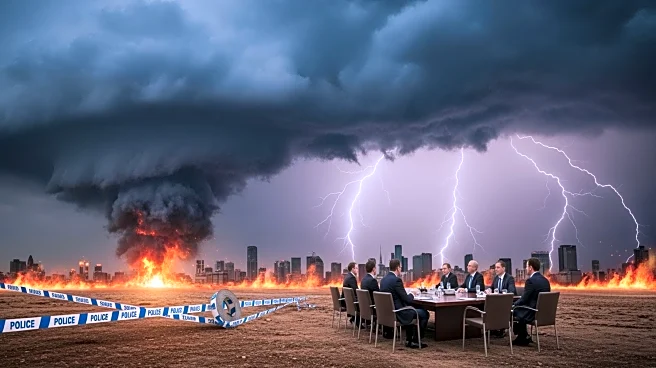What's Happening?
Israel launched airstrikes in southern Gaza on Sunday, October 19, 2025, after claiming that Hamas violated a U.S.-brokered ceasefire. The Israeli military reported that its troops were fired upon in Rafah
city, prompting retaliatory strikes. Health officials in Gaza reported at least 14 Palestinian casualties. The ceasefire, intended to halt over two years of conflict, is now under strain as both sides accuse each other of violations. Israeli Prime Minister Benjamin Netanyahu has directed the military to take strong action against any breaches, although he has not threatened a return to full-scale war. Meanwhile, Hamas has denied responsibility for incidents in Rafah, citing communication issues with its units in the area.
Why It's Important?
The escalation in Gaza threatens the stability of the ceasefire, which was brokered to end prolonged hostilities between Israel and Hamas. The renewed violence could impede humanitarian efforts and exacerbate the already dire conditions in Gaza. The ceasefire's fragility highlights the challenges in achieving lasting peace in the region, with potential implications for U.S. foreign policy and international diplomatic efforts. The situation also affects regional stability, with Egypt playing a key role in negotiations. The humanitarian impact is significant, as aid delivery and reconstruction efforts are crucial for the civilian population in Gaza.
What's Next?
The ceasefire's future remains uncertain, with ongoing negotiations to deescalate tensions. Egypt is actively involved in mediating talks, aiming to prevent further violence. The situation may prompt international stakeholders, including the U.S., to increase diplomatic pressure on both parties to adhere to the ceasefire terms. The humanitarian situation in Gaza requires urgent attention, with calls for increased aid and reconstruction efforts. The Rafah border crossing remains a critical point for aid delivery and civilian movement, and its status could influence future developments.
Beyond the Headlines
The conflict in Gaza raises broader questions about the long-term governance of the territory and the role of Hamas. The ceasefire agreement includes discussions on disarming Hamas and establishing an internationally backed authority to govern Gaza. These developments could reshape the political landscape in the region, affecting both Israeli and Palestinian strategies. The humanitarian crisis underscores the need for sustainable solutions to address the needs of the civilian population, which could influence future peace negotiations.









